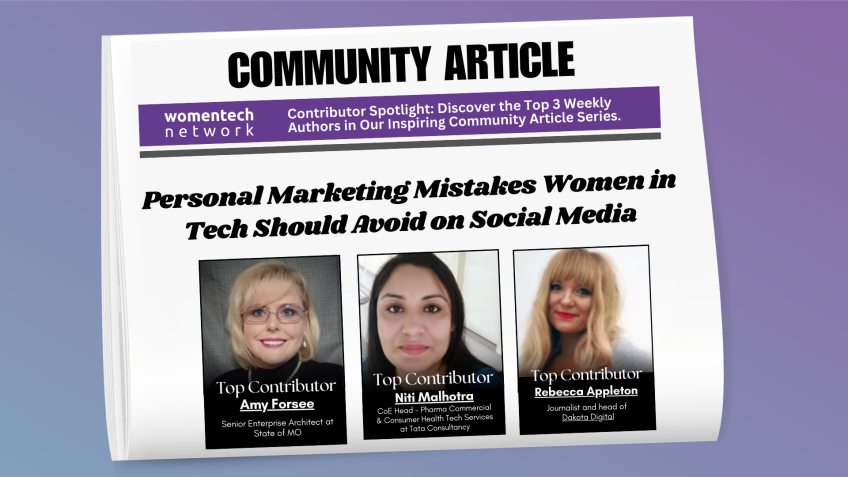Personal Branding 101: What is a personal brand and how do I build one?
Morgan Bell
Product ManagerBuilding Your Authentic Personal Brand: A Masterclass by Google Product Manager, Morgan Bell
Hello and welcome to today's article on building your authentic personal brand. This article is based on a masterclass delivered by Morgan Bell, a product manager at Google. The topic? How every individual can harness their unique attributes, interests, and abilities to build a personal brand that’s just as compelling as those of the big corporations.
Importance of Personal Branding
Before we delve into the steps on building your authentic brand, it's important to consider why we should even invest time and energy into establishing a personal brand. Often when we think of brands, we instinctively think of logos of established corporations such as Amazon, Starbucks, or Microsoft. Large corporations carefully construct their brands to invoke specific reactions and perceptions from consumers.
Establishing our personal brand can lead to the same outcomes. Notable figures such as Oprah, Elon Musk, and Melinda Gates all have their personal brands, inspiring a range of reactions and emotions in their audiences.. Just like these figures, our personal brands can guide how we're perceived by other people. In essence, our personal brand is our reputation.
As Michelle Obama puts it, if you don't define yourself, you'll be quickly and inaccurately defined by others. This resonates—the moment we step into a new environment, whether it's a new job or a classroom, people start making assumptions about us.
A Personal Brand Defined
An authentic personal brand is caringly crafted out of three core elements:
- Passion: What you do, and what you care about;
- Character: How you go about doing things, for example, are you a procrastinator or a hard worker?
- Perception: How others perceive you, which could fall anywhere from positive to negative.
These elements together form the basis for your personal brand.
Steps to Building Your Authentic Personal Brand
Step 1: Reflect and Breathe Life into Your Personal Brand
Understanding your personal brand requires honest self-reflection. Some questions to ponder when reflecting include: "Who am I?", "What do I stand for?", "What are my strengths?" These questions are critical to understanding who you are and how you desire to present yourself to the world.
As a guide to this process of self-reflection, certain resources like the Myers Briggs personality test or the Clifton Strengths Finder can be significant aids. Additionally, Morgan’s personal brand worksheet is a beneficial tool for further reflection.
Step 2: Make Your Brand Known
With your newfound understanding of self, the next step is to put these insights to practical use and make your brand known to the world. It starts with auditing your online presence, this can involve something as simple as a Google search or LinkedIn search to see how you are represented online.
Once you understand your existing online presence, it’s time to shape this presence to reflect your desired personal brand. This can be done through purposeful sharing on social media platforms, producing unique value, affiliating with other strong brands, and even creating your own website.
Step 3: Consider Representation and Public Information
Finally, representation is a crucial aspect of personal branding. This entails considerations such as graphic design, color palettes, online posting frequency and even language. It is also essential to note that while sharing your life is a part of personal branding, there needs to be a conscious balance between public information and personal privacy.
To Wrap It Up
In an age where digital interactions dominate and mold our reputations, personal branding is more important than ever. It encompasses who we are, what we do, and how we act. It represents us in our authentic, true self, forming the basis of our interactions with the world. As said best by Morgan Bell, "Your personal brand doesn't have to be the representation of every part of you. It's the things that you want to share and the things that you want to stand behind."
So, do take time to evaluate your own personal brand and remember—your personal brand is yours to create, share and control.
Video Transcription
All right. Hello everybody. Thank you so much for joining me today. I'm very excited to be here with you all. Uh My name is Morgan Bell. I'm a product manager at Google and today I am here to chat with you about how to build your authentic personal brand.We only have about 20 minutes today. So I will fly through this fairly quickly, but I will share the slides at the end with anybody who is interested in seeing them. So when we talk about brand, a lot of people think about brands of big companies, the logos on the screen that you see. I'm sure that you can name many of those companies just from a brief image. You probably recognize Amazon Starbucks and Microsoft. I live in the out of Washington area. So of course, these brands are very familiar to me, but they're very big around the world. And a lot of times when you see these logos or you think about these companies, there are different words that come into your head. Maybe for Amazon, you think of fast or Speedy because I can get a package overnight. Maybe for Starbucks, you think of coffee. I know, I certainly do and I visit them probably more than I should. These brands have built up this perception in what they represent so that us as and as consumers can understand what they stand for and can have that association. Now, the same is true for people. There are probably a lot of familiar faces on this slide.
Maybe you recognize Oprah or Elon Musk, maybe even Melinda Gates, these people all have their personal brands and when you see each of them, maybe you feel excitement, maybe you feel inspiration, maybe you loathe a few of these people. Maybe you're envious of a few of these people.
Maybe, you know, their major accomplishments or things that they've done. That's because just like the companies on the previous slide, they have a personal brand, they have things they stand for. Uh they have things that they know and that they represent and just because we're not big famous celebrities doesn't mean that we can't and shouldn't have our own personal brands as well. So that's what we're going to be discussing today. I really love how Michelle Obama put it.
She said, if you don't get out there and define yourself, you'll be quickly and inaccurately defined by others. And that's so true. Think about how often we show up in a meeting, maybe a new job, maybe when we joined a new school as a child. If we didn't introduce ourselves and say this is who I am. And this is what I stand for. People make assumptions, whether they're correct or not. And it's much better to get out there and set the pace of, hey, here's who I am. Here's what I represent. Here's what I stand for. And here's what I do rather than having somebody else make it up for you and trying to change that conversation in the future. A lot of times once somebody's perception is set, it's very difficult to change it. So today, we'll talk about a few ways of how you can start building your own personal brand today. So you don't have to be uh defined inaccurately by others in the future. So, what is a personal brand? Exactly. Well, it's a combination of three things uh for the most part, the first is passion, which is what you do. What are you passionate about? What do you care about this? What you can do is for maybe a job, maybe something you volunteer for. Maybe something in your personal life. Those are all part of your passion and a part of uh who makes you who you are next is character. And that's how you go about doing those sort. Certain things. Are you maybe extroverted or introverted?
Do you consider yourself kind and friendly or maybe, are you a bit standoffish? Are you a hard worker or maybe you're a procrastinator that works or waits till the very last second, that character also defines who you are. And last is the perception which we talked about before.
This is how others perceive you, people can have positive or negative perceptions, just like those brands. We talked about both the companies and the people. So how does this actually relate to you and how can you build your own authentic personal brand? Well, the first step is probably the most important step and that's to start thinking of yourself as a brand. I know it sounds bizarre but hear me out some of the questions that you need to ask yourself as you start thinking about your personal brand are things like who am I? What do I stand for? What are my strengths? And these sort of questions will help you figure out not only who you are but how you want to represent yourself to do this though. You do need to be honest with yourself and it does take some time and some reflection. So I have a couple of resources for you of how you can get started with that instead of just thinking about, oh, I'm strong or I like doing this thing. These resources will actually kind of help you guide, guide you through a process to determine those things. The first thing I have listed on here, some people are fans of and some aren't. Uh but I do put it on here because I think it's a good resource and you've maybe heard of M BT I or the Myers Briggs personality test.
Myers Briggs will give you one of 16 personality types and they're overarching personality types that may tell you if you're introverted or extroverted, if you handle conflict well, or maybe you like to stray away from it. The reason I share this is because I don't think that 16 personalities accurately describe everybody on the face of this planet. The thing I do find interesting with them though is reading through after you take this quiz, why they think that you're a certain way or perhaps how you may tend to handle certain situations. It's reading that and analyzing it and then thinking about, is that true? Do I handle things that way and determining if there are accuracies or inaccuracies with that assessment? But that in itself is a personal reflection for you. So if you haven't done that, the MTI or 16 personalities or honestly, even if you haven't done it in the past, I would say 12 months, I highly recommend you take it again. I've actually found that my BT has changed over the past 10 years about three times. Interestingly, they all had overlapping traits. But as I reflect on them, I see different parts of my personality or my leadership skills developing over time into the person I am today and those are changed by the things around me.
And I'm sure that my personal brand was very different than two. So if you haven't taken that lately. But maybe it's something that you've considered in the past. I would highly suggest that you do it again. It's also a fun thing to talk your friends into doing too and comparing stories. I did that with some of my friends a few weeks ago and we had a good time, another great resource. Uh This one is not free, but I do highly recommend. It is Clifton strains finder. Uh You can either go to their website listed here. The book along with a few other similar ones that sold on Amazon and other booksellers as well. Strains Finder is a great one because it actually will give you your top five strengths. It's a great thing to focus on your strengths because you have a natural ability and inclination to those things. A lot of times we get so caught up on our weaknesses in ways that we can improve. That if we were to invest in our strengths instead, you'll exponentially grow with those strengths and those weaknesses will be accounted for later or perhaps even in different ways. I know it might sound like a weird societal construct, but really focusing on your strengths has been proven to help expedite your career and your self confidence. So check out strengths finder, it will give you those top five. I always found mine really interesting.
I think that taking Clifton Strengths finder was the first time I had heard of the concept of ideation so somebody who's creative and good at coming up with ideas or a way to solve problems. That was 10 years ago. And now I'm a product manager and I have to ideate all the time. Sometimes things just make sense and add up. But once again, a great self reflection activity and ways to think about yourself and how you handle situations. And lastly, Morgan's worksheet, that's me. So I've created just a really brief kind of template and worksheet. You can find it at the tiny URL listed there, just personal brand with Morgan. Uh It's a good exercise to think about strengths, weaknesses, what you enjoy doing, what you don't enjoy doing. How do your family and friends describe you, what are the sort of things you want to do in the future? All of those characteristics are really important to consider. And so, so if you either go to once again that tiny URL or you can scan the QR code on this slide as well, it will take you to that document, you'll be able to create a copy and I highly suggest just taking 10, 15 minutes or even longer if you want to work through that and really do some great self reflection.
I find it to be a really good activity myself. And once again, if you did join us a little bit late, I will be sharing these slides at the end of the presentation. So you'll have access as well the second thing that uh you'll have to do after you've done all of that good self reflection been like, yes, this is who I am, this is who I want to share with the world. Now. We actually have to go do it. So the first part of making your brand known is auditing your online presence. Where are you showing up? Not showing up? I'm not saying you need to go be a social media influencer or live your life on there. But it is important to go and see how you are showing up a basic Google search or a linkedin search will tell you a lot about the things that come to the surface. For example, if I search myself on linkedin or Google, I hope that things come up like the community work, I do some of the awards I've won maybe my resume being able to see how I'm already being represented online. Chances are by either work I've done or things other people have published gives me a great start of knowing what I need to add to or what I maybe need to fix and amend.
So my personal brand is mine and not once again what other people have put out there with that being said, if you do decide to take part of things online, whether it's something like Instagram or Twitter or maybe something a little bit more professional leaning like linkedin, you'll really want to be purposeful in what you share and how often you share it.
I'll talk a little bit more about this in the next slide. But being purposeful in what we do is incredibly important as we're building our own authentic brand. This also goes along with finding ways to produce unique value. I work in the developer tooling space at Google. I've previously worked at Microsoft and Twitter. I have unique value and that I've worked in a lot of different roles. I've been a product manager. I've been a product marketing manager. I've been a program manager. I've been in Deverell. So my unique value I can bring is really that uh those unique ideas that unique skill set to the table and attack problems in a different way. I've built that into my personal brand and that's actually part of what helped me land my current job at Google, which I just joined in December. It was being able to talk to all of those different skill sets and understanding the unique value that I provide that I was able to say this is why you should give me this job and this opportunity to build this new product in area. And that's exactly what I'm doing today. Another thing you can do is associate yourself with other strong brands. So let's say you're at a conference. Uh Grace Hopper Conference is coming up in the fall. That's a great example.
I'm actually in California right now because I was just attending Google IO being able to say, hey, I'm here, I'm a part of this community. I'm going to use their hashtag heck we're all at this conference, right? Use the hashtag be a part of the online community. The brand might even respond to you. Maybe they'll re share something that you put. It's a great way to get your name out there and to get involved in the communities that you're a part of. And my last suggestion is to build a personal website. Um Maybe you're not a developer and that's just fine. I actually personally host my own website on Squarespace and I just pay for a personal domain, which I think is 8 $12 a year. You can go to Hello Morgan dot dev and you'll find my personal site if you are a designer or you are a web developer though, I highly suggest building your own site since it is kind of a portfolio of your own for sorts. The great thing about having a personal website is it's yours, you curate it and those things will stay static if you allow them or they'll be updated when you decide social media can bring in different search results and there's all of that kind of stuff. So having your own personal website to send people to or just to have as a core place of reflection of, here's who I am is a great central spot and central identity for you online there's a lot of bullet points here but just some other things that I want to leave you with to consider as you build your personal brand.
The first is what we kind of talked about online. What channels will you use? Will you post on Instagram? Some people are great about that. They love filming videos, they love filming or creating content or visual aids. I find that I'm not as good at that. So I spend more time over on Twitter because I can come up with, you know, 100 characters really fast. So I have a presence on multiple platforms, but I do focus more of what I share and consistently sharing on places like Twitter and that's what I've chosen, but you'll have to choose what's right for you. If you decide to go down more of that social media route uh with channels, it's also important to stay semi active on there. So you will see me occasionally post on Instagram, you will see me occasionally post on linkedin. That way things don't get stale. And I'm continuing to update my personal brand and really just keeping a freshness everywhere that I am. Next is who's your target audience? Um Maybe this matters to you and maybe it doesn't. I put this example in because when I worked at Microsoft, for example, I worked with student advocacy uh so helping student developers get inspired to join tech, give them access to the technologies and content that they needed. So joining Instagram was really important for me.
So I could connect with them and be able to get their feedback to take back into my work. So if there's a certain target audience that you may have or audience that you want to connect with thinking about the kind of content you're making or where you're going is important. And then the kind of content you want to share, it goes beyond just sharing a photo versus sharing text. It could be blog posts, it could be funny, things that happen to you. It could be coding tips. If you're an expert in that area, things like technical tips and coding tips are very relevant to people and people always enjoy them. They're a great way to start conversation. Um If you find me, you'll even find me posting pictures of my dogs. Uh I kind of share all across the board. But if you're just getting started picking one or two of these things is a great way to cement yourself and uh just start posting consistently, you also want to think about what you want people to take away. Do you want to be considered as? Oh, they're a professional. They are a source of truth. Absolutely. They don't share anything about their personal life. That's fine. They're very technical. That's great. You can use your personal brand and your channel for that.
If that's what you decide to do, some people go on the whole opposite end of the spectrum and say I am a whole person and I'm going to share my whole life and here's how it is. Once again, that's their personal brand, that's what they choose to share. And so think about what you want to share what you want people to take away. And then also what are your goals with building your personal brand? Is it just to have one? So other people aren't creating one for you? That's fine. Is it to build up your network? That's something that I've really loved doing as I've been investing in my personal brand over the past several years, I've met so many different developers from across the world, people from different companies. My network was part of what helped me get my most recent job at Google. And so if you think about what are your goals with your investment and how much are you going to invest in building your personal brand? Those goals can help align there as well. Other things to consider as far as representation goes, I find it really helpful to come up with a consistent identity. So most websites nowadays use user names. You'll find me as live love geek on everything I made that when I was a child and I guess that I knew my destiny was to be a geek. So here we are. Um But having that consistency, people will actually come to me.
I had a few people yesterday at Google Island. And they're like, oh, you're a live love geek. They didn't even know I was Morgan just live love geek and that's fine. That means that they know uh what I stand for who I am and we could just pick up conversation as we go. But it does allow people to find you and stay consistent over time. If you decide to go the visuals route, especially on sites like Instagram, there are so many resources to create great things. You do not need to be a graphic designer. Uh If you have not tried, can they are fantastic. They have free accounts, paid accounts. You can create slide shows like this one that I'm doing right now is actually using, can they have tons of templates for free? Tons of add ins photos, animations, you name it. I think you can actually even build a website through can. Now they're pretty fantastic if there's something really specific you're looking for. Um whether it's another visual thing or maybe you're even just creating your new resume. Etsy has a lot of templates that you can pay just $5 for and then go and make your own. So if you're looking to create some of these things, I highly suggest checking out either can or Etsy or as you're looking at maybe color consistency, I personally love blue. So you'll see blue.
A lot of across a lot of my personal branding, some people get that specific with their brand. Some people don't. Um but it's kind of coolers dot Co coo Lors dot Co as you see on the slide gives you a matching color palette. So if you don't find yourself great with colors, but you want to get better at that. It's a great resource. We talked briefly about Ton Nation in the first one. Are we funny? Are we sassy? Are we serious? What are we sharing? And it's good to think about. But another thing that I wanted to throw out there is a lot of people that I've mentored have come from other countries where English is not their first language, but they want to get more involved with English speaking communities. Um Software like grammar is really great for that.
It'll help you check your tone, ask if you're wanting to communicate in this way, that way, make grammatical suggestions and it will learn from your writing style as well. So if that's something that you care about or want to invest in, I suggest checking out grammar and lastly one that's just good to think about is public information. What do you want people to know or to not know? Like I said, I'm pretty open, I'll share pictures of my dogs, I'll share pictures of the sunset off my back deck and I'll also post about tech things. However, what I don't do is I don't typically share my location. Like if I'm uh at a small event or I'm staying at a hotel, I won't post about that. I'm staying there until after I leave for safety reasons. That's something very purposeful I do about public information and finding that dividing line. And so I'm sure there's examples in your life as well where you would want to say, I don't want to share anything about my kids or I don't want to share anything about that. And I just urge you to think about that early on as you're building up this personal brand because your personal brand doesn't have to be the representation of every part of you. It's the things that you want to share and the things that you want to stand behind.
So with the kids' example, you may love them and you know, absolutely and want them to be a part of your life. It doesn't mean that you need to post them on other places and that's so true with other things. So just stay true to yourself and what you want to share but be purposeful and what you share out there. That's all I have for today. Hopefully, this quick rundown about what a personal brand is, how you can start building one for yourself and how you can put yourself out. There was really useful to all of you. If you're interested in the slides, you can see the tiny URL there at the bottom of the screen. It is tinyurl dot com. Slash WTGC, which is of course the conference we are at right now, dash personal dash brand, dash slides. Uh You'll be able to find that content there along with the personal brand worksheet that I mentioned earlier. If you find that as a useful resource to getting started and building your own personal brand, I hope that you all have an amazing rest of your day and please feel free to reach out to me on Instagram or Twitter if you have any other questions or want to connect.
Thank you and enjoy the rest of the conference. Bye.






